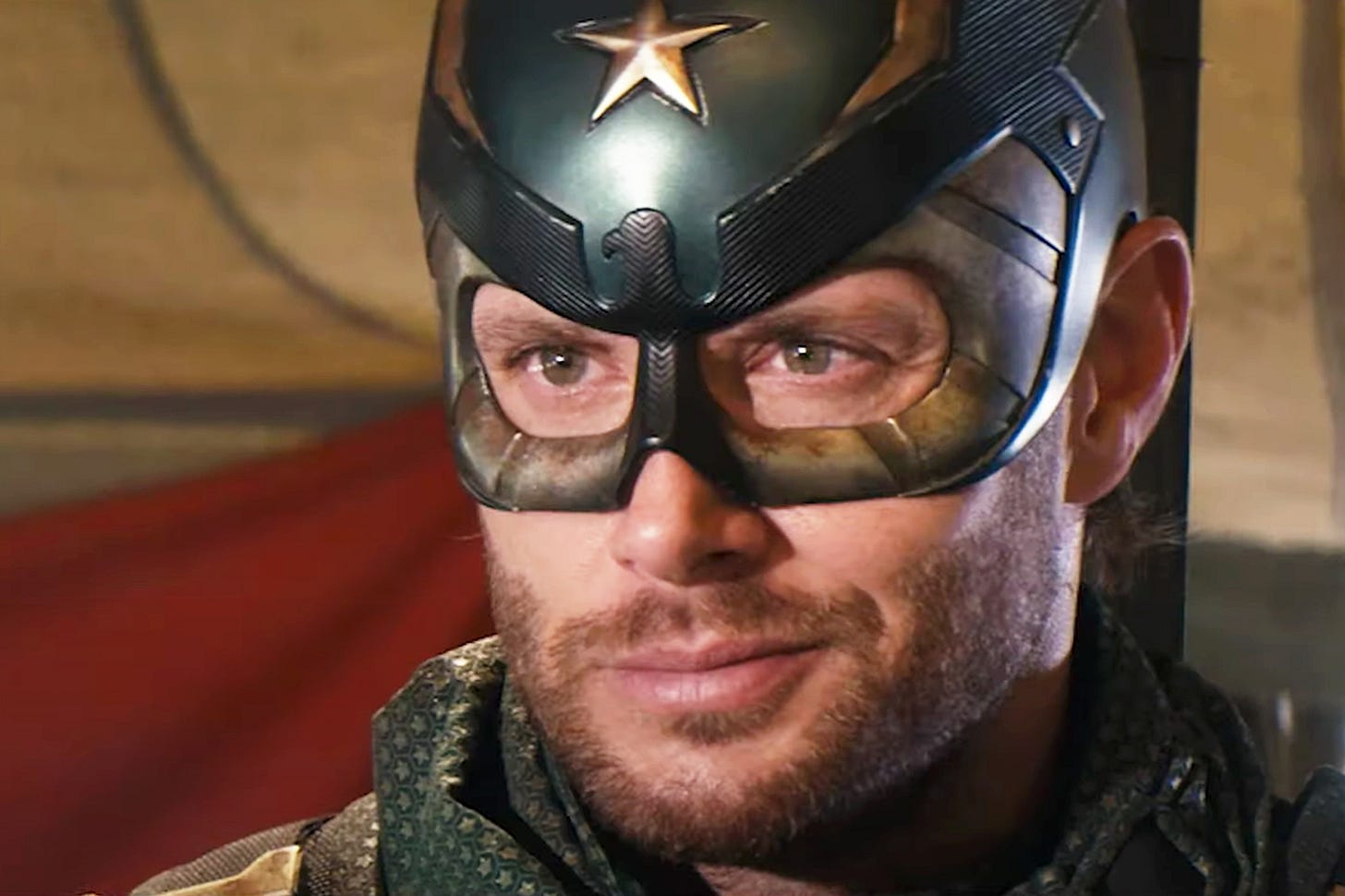The Boys Is Still Super
Season 3 isn't quite as good as Season 2, but it's still pretty great.
The Boys, Season 2, released in 2020, was one of the best superhero narratives of the modern era, or of any era. The Nazi supervillain Stormfront (Aya Cash) infiltrated the corporate superteam The Seven, allowing showrunner Eric Kripke to spin a deceptively nuanced story about capitalist complicity in fascism and the line between girl power appropriation and actual feminist empowerment.
Stormfront effortlessly weaponizes very American xenophobia, racism, and greed, cheerfully seducing social media trolls and homegrown evil-Superman psychopathic MAGA hero Homelander (Antony Starr) to her program of democratic overthrow and racist purity. It was unflinching, laugh-out-loud funny and horrifying, and the triumphant conclusion felt hard-earned—not least because the triumph was far from total.
That’s a tough act to follow. Season 3 is, predictably, not as solid as its predecessor. It’s still solid, though. And its weaknesses help clarify for fans what, specifically, is the strength of the series.
Humans Are Boring TV Clichés
The story picks up a year after season 2. Homelander’s relationship with Stormfront has caused his popularity to plummet; he’s been stewing more or less quietly. The Boys—a group dedicated to destroying and containing the world’s celebrated but generally sociopathic superheroes—have started to work for the government. They too are trying to be less murdery.
The truce soon starts to fray, though. Homelander begins to spiral, threatening among other things to murder everyone in New York. The Boys set off in search of an all-powerful weapon that killed Homelander’s uberpowered predecessor, the sort-of Captain American analog, Soldier Boy (Jensen Ackles.) They hope it can put Homelander down too.
The Boys also have access to a new form of compound V. The original is what gives superheroes their permanent abilities. But this new injectable variant grants a normal human powers for 24 hours—with some unfortunate side-effects.
The season puts a good bit of effort into fleshing out the backstories of the Boys, particularly obsessive-compulsive big-man-with-a-heart Mother’s Milk (Laz Alonso) and Eurotrash drug chemist genius Frenchie (Tomer Kapon.) In doing so, it confirms once and for all, that these characters and their generic self-actualizing arcs just aren’t that interesting.
Neither are the standard anti-hero character beats of head boy growling hard-case Billy Butcher (Karl Urban). And the show has run out of things to do with Boy newbie and beta-male Hughie (Jack Quaid), who repeats the same it’s-okay-to-be-a-nice-guy storyline from the first couple seasons.
The conflict around the injectable 24-hour compound V is also less than compelling. Powering up is supposed to cross some sort of absolute line. But does it? How is killing someone with your eye-beams worse than just shooting them? In any case, it’s clear from the show that some supes are horrible, but others aren’t. The Boys is best when its moral conflicts resonate with those in the real world. But the parallels with drug addiction here just seem forced and confused.
The humans, in short, are kind of dull. The superheroes, though, are magnetic—not because of their superness, but because they’re so painfully, laughably, frighteningly human.
Superheroes Are the Human Ones
The Deep (Chace Crawford), a hero with gills who talks to and has sexual relationships with mollusks, has a new marriage and a best-selling book. But he remains a bottomless well of self-entitlement and self-doubt, a geeky victim forever dreaming of being the bully.
A-Train (Jessie Usher), a speedster side-lined with a heart condition, tries to rebrand himself with an Afro-consciousness he transparently doesn’t care about at all. When that fails he goes about systematically betraying himself and everyone he loves in the pursuit of validation from people who hate him.
Even the masked, expressionless, voiceless Noir, a complete mystery in past seasons, gets a stunning story of his own, told almost entirely through animation. It’s a tour de force—innovative, ridiculous, and heartbreaking.
The Noir subplot is the highlight of the season. But the show’s bread and butter are Starlight (Erin Moriarty) and Homelander. Moriarty, as the blonde, glowing, diminutive Christian heroine, manages to turn wholesome goodness into admirable cool with a panache that rivals Christopher Reeve. Even her f-bombs seem suffused with an inner light.
As for Antony Starr, he is simply one of the best actors working today. His Homelander’s face is a flexible infinitely expressive mask, twisting from an ingratiating smile, to heartbroken pout, to the lascivious sadistic smirk of the inveterate bully. He’s at once dead inside and seething with so many emotions that he can barely contain them. His every hearty greeting and racist aside is suffused with potential violence, and when he explodes it’s genuinely terrifying.
The season explores familiar ideas: the link between nostalgic American patriotism and fascism; the utter cynicism of corporate virtue cosplay; the ease with which violent heroism slips into violent abuse. Those themes still resonate, even if they don’t explore new ground. The Boys Season 2 was great. Season 3 is merely excellent. But especially with more superheroes and less Butcher, it seems like it could maintain this level of quality for the duration.



Yes! Love this, and you nailed it on the characters. Starlight and Homelander steal the show. The Hughie character was essential in Season 1 and into 2, but yeah, that shtick starts to wear thin. I'm about the start Season 3 myself. Anthony Starr legitimately frightens me as Homelander. He just has the character down cold, really into the pathos of the character.
I don't know if they are doing this on purpose, but I love that Anthony Starr as Homelander is styled like Zach Morris on SBTB. Another superhero figure whose selfishness and narcisism needed more exploration.